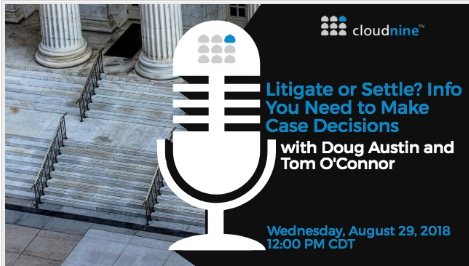The Battle to Recognize Bloggers at ILTACON: eDiscovery Trends
If you attended ILTACON last month, you probably enjoyed another great conference. But, behind the scenes, the show hit a few bumps, especially for the blogger community. Oh, and the CEO left before the show too.
Before the show on August 9, Bob Ambrogi detailed the departure of ILTA’s CEO Dan Liutikas in his LawSites blog post titled Déjà Vu All Over Again that revisited recent management reshuffling of key ILTA personnel the past three years right around conference time. Bob’s post included verbiage from a letter sent to ILTA partners by Angela Dowd, president of the ILTA board to announce the departure of Liutikas.
That’s just the CEO. But, then, there was the whole blogger “fiasco” this year. Now, that’s serious! :o)
My colleague, Tom O’Connor detailed the leadership issues and also the blogger issue in his blog post (WHAT IN THE WIDE WIDE WORLD OF SPORTS IS GOING ON AT ILTA?) on his Techno Gumbo site back on 8/13. As Tom noted, “a number of prominent bloggers who had been long time supporters of the group and its conference were surprised to find that their application for a press pass to attend and report on the show were denied.”
Those bloggers included longtime ILTA participants like Craig Ball, Chris Dale, Kevin O’Keefe of LexBlog and even Tom himself. For the first time in several years, I did not apply for a press pass as I had a full schedule of meetings and didn’t feel like I would attend enough sessions to make it worthwhile (I still covered the show on this blog, BTW).
Apparently, to qualify for a press pass this year, you had to “work for a publication, news service, broadcast outlet or news site that is regularly issued and published primarily for the dissemination of news, and operates independently from any commercial, political, government or special interest. Only media whose primary responsibility is the coverage of the legal, legal technology, technology industry, workforce tech issues, and related news will be considered for credentials.”
Which eliminated a lot of people. Would probably have eliminated me if I had applied. Kevin also covered the topic on his Real Lawyers blog (Legal bloggers are part of the press – for conferences too). As he noted, “Apparently the goal in declining press passes to the organization’s members is to force those members who blog to pay registration fees and to blog favorably of the conference and the association.”
No, what it does instead is cause them to stay home and not attend – at least in many cases.
Well, Tom’s post was picked up – a lot. People took notice of ILTA’s issues – at both the leadership level and with regard to its blogger policy.
And, here’s the good news: ILTA seems to have learned from its mistakes on that front. As Kevin noted in his blog: “During the conference, ILTA reached out to bloggers and other members of the press to formulate a more progressive policy when it came to bloggers… My understanding is that ILTA attempted to work with bloggers who attended so they were included as press and is now looking to bloggers to help formulate a new policy going forward.”
Live and learn! ILTACON is a great conference every year – hopefully, next year, the behind the scenes issues will take a back seat to the quality of the conference overall.
So, what do you think? Did you enjoy ILTACON this year? Please share any comments you might have or if you’d like to know more about a particular topic.

Sponsor: This blog is sponsored by CloudNine, which is a data and legal discovery technology company with proven expertise in simplifying and automating the discovery of data for audits, investigations, and litigation. Used by legal and business customers worldwide including more than 50 of the top 250 Am Law firms and many of the world’s leading corporations, CloudNine’s eDiscovery automation software and services help customers gain insight and intelligence on electronic data.
Disclaimer: The views represented herein are exclusively the views of the author, and do not necessarily represent the views held by CloudNine. eDiscovery Daily is made available by CloudNine solely for educational purposes to provide general information about general eDiscovery principles and not to provide specific legal advice applicable to any particular circumstance. eDiscovery Daily should not be used as a substitute for competent legal advice from a lawyer you have retained and who has agreed to represent you.







